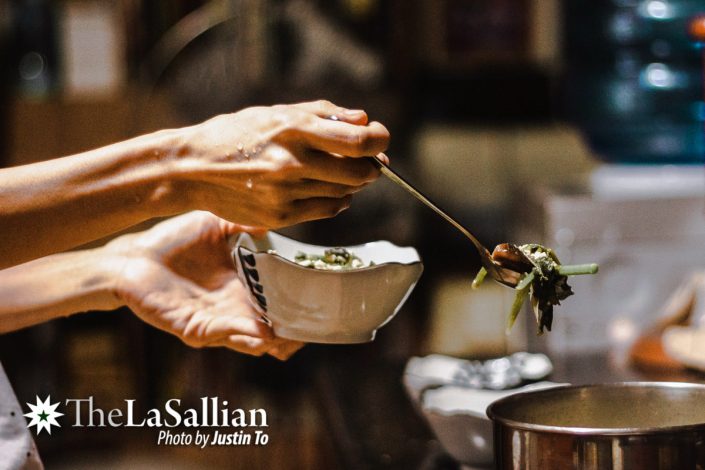
Last December 11, the University hosted its fifth annual Hult Prize OnCampus Competition Pitch Day via Zoom. The event was under the supervision of the Lasallian Social Enterprise for Economic Development and the campus’ Center for Social Entrepreneurship.
The Hult Prize has been paving the way for the youth to envision the possibilities of their leadership and has been innovating the way problems are being solved globally since 2009. With the theme Food For Good, the five start-up finalist teams each delivered six-minute presentations on their innovative social enterprises revolving around transforming sustainable food systems.
Something fresh
The day started with a mini-conference with the judges, an analysis of the importance of the youth’s involvement in social enterprises, and the theme’s significance to the country. Norby Salonga laid out the challenge, saying, “I look forward to [seeing] a clearer impact.” Meanwhile, Kristine Ever Juan, a research specialist at the Philippine Long Distance Telephone Company, states that “We don’t want your ideas to just be a competition pitch but something that could really change the world.” Laurence Lumagbas, an Advisory Manager for Strategy & Sustainability Services at Deloitte Southeast Asia similarly hopes for a team that has “that passion and drive to create more than just a business plan.”
Adrian Holgado (III, AB-PSM) the campus director for this year’s Hult Prize was ecstatic with this year’s theme, saying “I believe it is about time that we recognize these problems in the food industry as we mitigate against the bigger problems that many food producers globally are making.”
Although the Philippines is an agricultural country, the judges highlighted that food insecurity is still as relevant an issue as ever. Holgado mentions that competitions like the Hult Prize enable the youth to face these deeply-rooted problems. “Students of various disciplines are empowered to gather together, to offer something to the table, and to exhibit these talents through an idea for a social enterprise,” he adds.
Risk takers
After a short break, the teams were given six minutes to pitch their start-up to the judges. Team ABANTE kicked things off with their compost shredder bins for middle to high income households. Team FMX, on the other hand, aimed to promote the farm-to-table social movement, presenting their application named Farmer’s Market Exchange that enables consumers to connect consumers with local farmers.
The next team, ADLAW proposed a micro franchising business model. Taking inspiration from Filipino street food culture, the Adlaw Food Cart promises affordable and healthy food options. Aside from aiming to make healthy food more accessible, they also plan on employing street vendors. AgriForce PH, on the other hand, focused more on improving rice production with their products Protent and Provine, which they claim can protect crops from rigorous weather conditions. Lastly, Team Tahanan had sustainable cities in mind when they pitched their urban farming plans, which sought to make homes and communities self-dependent on organic food.
For good
The judges relied on five criteria—the originality of the idea, the clear demonstration of their impact, the team’s commitment, the “wow factor” from the judges that compels them to personally support the vision of the team, and lastly, the traction—to determine the winners. They also took into consideration the team’s quantitative data to evaluate the plausibility of their idea.
The ADLAW team, composed of Samantha Avila (III, BS-MKT), Ailh Diosana (III, BS-MKT), Emil Angelo Conception (I, BS-ME), and Jessica Jaye Ranieses (I, DBA), emerged as the winners of the DLSU Hult prize and are the opportunity to represent the University in the regional summit. Tahanan members Eloizza Doma (I, MAE), Jay Pee Maalihan (I, DIPDECO), and Shayne Alvarez (I, AEF-MGT) won second runner up while ABANTE members Ralph Stephen Saavedra (I, BS-IBS), Fernando Magallanes Jr. (I, MEM-BME) and Francis John Magallanes (III, BS-CPE) finished in second place.
Diosana mentions that the strength of ADLAW is in their diversity, saying, “We strategize uniquely in line with our degree program and personal advocacies which improves everybody’s idea.” Moreover, he also emphasizes that the integration of Filipino culture in their enterprise was a crucial factor in connecting with their market.
Just the beginning
Despite their win, ADLAW acknowledges that their business plan still has a long way to go before being in shape for the upcoming regionals. For Avila, the most valuable asset a start-up can have is compassion. “The biggest disease we probably suffer from is from feeling unloved, and I know we can show more of that love to poor Filipinos who need our help, through our Kagat Adlaw Carts,” she shares.
Undeterred by the challenges of the new normal, the organizers were successful in facilitating a platform for the teams to share their innovative ideas. “Take the risk in initiating change, for the world needs the youth to step up now more than ever,” urges Holgado.
